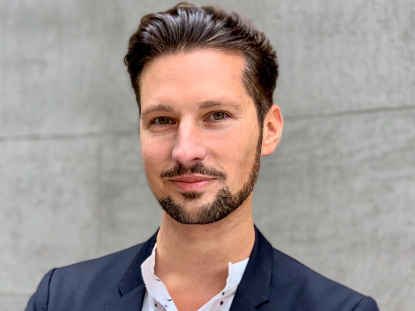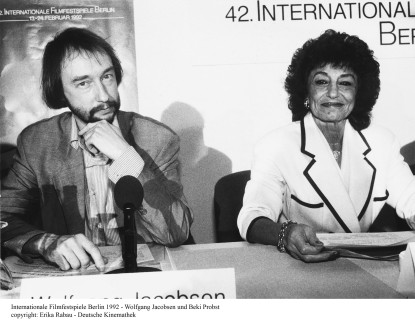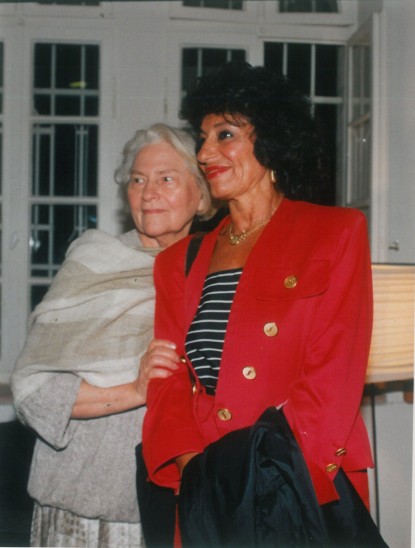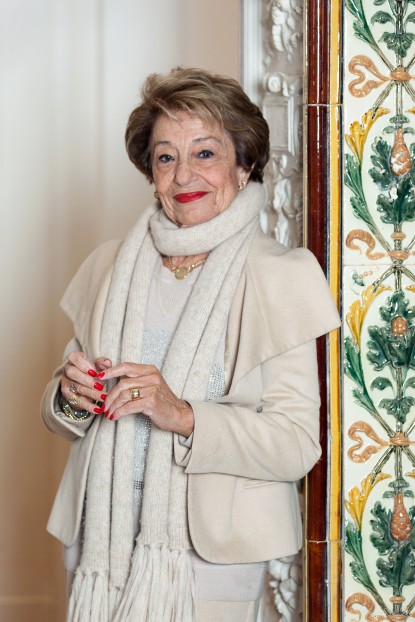Biography
He studied cultural sciences, audiovisual communication, social science and history in Bremen, Germany and Valencia, Spain. During his studies, he began working for the Oldenburg International Film Festival in 2008 and became a co-director in 2011. Starting in 2010, he also worked for Independent Partners Film. From 2012 to 2020, he was department head for International Festival Relations & Producers Liaison at German Films.
He regularly appears as a guest lecturer at film schools and panelist at industry conferences and film festivals and served on various juries.
Beki Probst has been with EFM ever since, in the role as President as of 2014, when Matthijs Wouter Knol took over the reigns as market director. Turkish-born Beki Probst remains a strong symbol for what the EFM has become under her leadership, a reason for Festival Director Dieter Kosslick to give her one of the annually awarded Berlinale Cameras. “Today, when I think back,” Beki Probst recalls “and think of the rapid changes we've seen in the last years, there's something that stays with me, as true now as it was then: for me, the film market was always a place for people to meet — to talk, to exchange thoughts, develop ideas and speak frankly with each other about their plans and projects. In short: we wanted to create a platform for the international film industry attending the Berlinale. And we did. And moreover, with the move to Potsdamer Platz we gave that platform a marvelous space in which to exist.” Since 2001, Beki Probst had a strong team on her side, co-directed by Karen Arikian (2001-2008), Catherine Buresi (2008-2013) and Andrea Kaul (2013-2014).
Over the years, the EFM has enjoyed steady growth with spikes in overall registration coming first in 2000, when the entire film festival moved to Potsdamer Platz, and again in 2006 when the EFM moved to its current home in the nearby Gropius Bau — one of Berlin’s landmark museums and an historical exhibition space dating back to 1881. A steep increase in buyer registration the following years — which included a corresponding increase of high profile participants — confirmed that the move, and the accompanying expansion, was successfully addressing the interests of the industry.
Only a few years later, a further expansion in 2009 of the EFM with the introduction of the EFM Marriott Offices and Suites in the prestigious Marriott Hotel at Potsdamer Platz. The new official second location of the Market features 3 floors of additional premium exhibition space in response to the yearly increase in exhibitor demand.
In the past decade, EFM’s attendance has grown steadily. In 2017, approximately 9,500 registered participants were able to view some 730 films, of which over 75% were market premieres, in 40 state-of-the-art cinemas. Needless to say, a significant number of the films on offer come directly from the Berlinale in its various programmed sections, ranging from Competition titles to films from Panorama, Forum, Generation and the German-cinem section Perspektive Deutsches Kino. In the past years, the World Cinema Fund (WCF) screened several of its supported films and successfully helped them find the right sales agents. Alumni from the Berlinale Talents programme have a chance to book screenings in one of the market cinemas as well. After several popup cinemas for VR content in the years 2016 and 2017, EFM offers a permanent VR Cinema this year at the Marriott.
The ties between the Berlinale and the EFM have always been very strong, and were further intensified and reaffirmed by several new projects and platforms that sprouted in tandem between Festival and market in recent years. The Berlinale NATIVE programme, focusing on films by indigenous filmmakers was reflected with a lively stand at the Gropius Bau, Berlinale Talents has a strong presence there as well which serves as a hub for up-and-coming sales and distribution execs. German films nominated for a German Film Award (a ‘Lola’) are all screened at EFM. The cooperation between the EFM and the Berlinale Co-Production Market has been boosted by the EFM Producers Hub, a platform for market-registered producers — looking for peers, financiers and aiming to broaden their network — before entering the Co-Production Market with a selected project. This platform was joined this year by ACE, a renowned European producers association that makes itself visible by hosting a strong daily conference programme at the Producers Hub. Documentary films have gained more attention and visibility at the Berlinale and this has reflected itself at EFM as well: in 2009, a new platform for documentary film was introduced and celebrates its own anniversary, aptly named DocSalon and with a strong programme put together by the European Documentary Network (EDN). Last but not least, Dieter Kosslick’s initiative Berlinale Africa Hub, a high-tech design pavilion in the Gropius Park right next to the market’s main venue, not only offers a meeting spot for everything concerning the Sub-Saharan film industry, but also has a strong focus on digital innovation that is revolutionizing developments in the audiovisual industries on the continent. At EFM, Africa is seen as a world where solutions for the future are made and new audiences can be found.
With the amount of exhibitors increasing to over 540 in 2018 and both the Gropius Bau and the Marriott Offices being sold out months before February, the scale and complexity of the market have grown as well. To help visitors navigate, EFM has developed a structure that helps visitors to find what they are looking for. A variety of EFM platforms help to do so. The Drama Series Days started offering a dedicated event to a growing number of film professionals engaging in the development and production of high-quality drama series. Market screenings of brand-new series were complemented by networking events, showcases and a conference programme. The platform grew into a series market within EFM and moved to the Zoo Palast cinemas, attracting an international community of series top executives, producers, sales agents and funding reps. The drama series platform was boosted in 2018, with the premieres of the Berlinale Series also taking place at the Zoo Palast and intensifying festival and market cooperation.
Producers have become a significant group of EFM’s visitors, and on top of the EFM Producers Hub, a central space for producers attending, specific events cater for the needs and interests of this increasingly important group. A Sino-European Producers Seminar shines a light of opportunities for Chinese and European producers to co-produce, a programme set up in 2015 with the organization Bridging the Dragon. Which role producers will play in the years to come has been a recurrent topic a EFM, in 2018 addressed in sessions like Producing 2020, facilitated by market research global player McKinsey & Company.
EFM Horizon has been the latest addition to EFM, completing its portfolio of platform and with a focus on innovation in the film industry. In its inaugural year, EFM Horizon highlighted technology and how it will affect business models. In 2018, the programme has doubled in size and attracted a range of forward-thinking partners: with Telefilm Canada, the effect of Blockchain technology is analysed, the Frankfurt Book Fair and its Arts+ programme shine a light on the consequences and advantages of artificial intelligence (AI) on creative industries like the publishing and film industries. Virtual Reality (VR), the talk of the town in 2016 and 2017at EFM and subsequent markets and festivals, stays present at EFM Horizon. The current status of VR and AR is discussed at the VR NOW Summit, but also relevant investors are identified at the VR NEXT Investors Club. The Propellor Film Tech Hub, an initiative of EFM, the International Film Festival Rotterdam, CPH:DOX and Berlin-based startup Cinemathon, hosts a new session featuring disruptors in the industry. A strong part of EFM Horizon is also the Industry Debates, hosted by IFA: tackling the most burning topics of the industry at the beginning of the year, the Industry Debates have become a good place to present and discuss new trends and set the tone for upcoming changes to expect. The EFM Horizon programme has its own venue: the Berliner Freiheit, next to the Marriott Hotel.
Starting with a successful Mexico focus in 2017, EFM offers an opportunity to one country every year to highlight its industry. Canada in Focus 2018 will enable market visitors to discover 10 Canadian producers to watch, learn about innovation best practices in Canada and get insights in strong documentaries from the country that just needs a maple leaf to be recognized. Together with Canada, and new countries I the years to come, EFM helps industries to learn from each other, spark new ideas and boost business opportunities and international cooperation.
With the Sundance Film Festival, EFM has a cooperation that goes back over 10 years. It helps producers and sales agents with films at the independent North-American film festival to screen their films at an international market straight after its premiere — and has brought many films to EFM in the past years, in 2018 including VR projects that were first presented in Sundance’s ‘New Frontier’ programme.
Unlike most other film markets, the EFM operates in close proximity — both spatially and in terms of cooperation — with the Festival. Looking back, Beki Probst and Matthijs Wouter Knol explain, “In 2008 we had the first documentary presented in the Competition. Nowadays, there is a plethora of documentaries all over the festival, including the market. The EFM has responded to this development with DocSalon. The innovations of the Berlinale are reflected in the Market — and vice versa. The EFM and the Berlinale complement each other as a fruitful symbiosis.”
The European Film Market started in 1988 in what is now known as Bikini Berlin in the Upper West part of Berlin. The Gropius Bau was still divided from the House of Representatives by the Berlin Wall and Potsdamer Platz was a no go area in the city. Almost 30 years after the fall of the Wall, Berlin has emerged as a hip, energetic and innovative place to be, making coming to the Berlinale, whether as audience, filmmaker or businessperson, ever more attractive and exciting.



